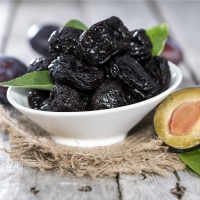Dried Plums Deter Colon Cancer

Research suggests that eating dried plums can positively affect the gut microbiota – the bacteria that live in the gut – and possibly reduce the risk of colon cancer. Dr Nancy Turner, Texas A&M AgriLife Research professor in the nutrition and food science department of Texas A&M University, and colleagues investigated the potential cancer-protective properties of dried plums using a well-established rat model of colon cancer. For the study, rats were fed either a diet containing dried plums or a control diet. Both diets were matched for total calories and macronutrient composition so that the effect due to diet would be attributed to compounds uniquely found in the dried plums. Results showed that consumption of the dried plums triggered positive changes in the rats’ microbiota – increased levels of Bacteroidetes bacteria and reduced levels of Firmicutes bacteria in the distal colon. Rats consuming dried plums were also found to have significantly reduced numbers of aberrant crypts, aberrant crypt foci and high-multiplicity aberrant crypt foci compared to control rats. Aberrant crypt foci are one of the earliest observable precancerous lesions and are considered to be a strong indicator for cancer development. “Dried plums contain phenolic compounds, which have multiple effects on our health, including their ability to serve as antioxidants that can neutralize the oxidant effect of free radicals that can damage our DNA,” said Professor Turner. “From this study we were able to conclude that dried plums did, in fact, appear to promote retention of beneficial microbiota and microbial metabolism throughout the colon, which was associated with a reduced incidence of precancerous lesions.”